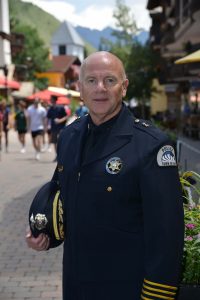
The safety and wellness of police officers are critical components of a properly functioning agency. While historically undervalued due to perceived cultural norms, insufficient resources, or lack of awareness, the profession continues to make an important shift toward prioritizing comprehensive officer health.
Creating meaningful change in police culture around this topic may be a long process and not always an easy one, as there are no one-size-fits-all solutions. However, it is incumbent upon us as police leaders to ensure that we take the appropriate steps to maintain a culture and policies that support holistic approaches to wellness and encourage help-seeking behaviors. We as police leaders need to listen to and meaningfully engage with staff to understand their needs and develop internal leaders who will help drive the culture change. We need to show top-down support for wellness while embracing ground-level ideas and enthusiasm. True, lasting improvement comes at the organizational level, and it is our duty to remain open and engaged, educate ourselves, and lead by example.
We as police leaders need to listen to and meaningfully engage with staff to understand their needs and develop internal leaders who will help drive the culture change.
The complexity of these issues necessitates innovative and far-reaching strategies at multiple levels. My home state of Colorado is contributing to this dialog through a number of initiatives.
A number of Colorado police agencies began early assessments of officers’ fitness and nutrition to address preventable cardiac and metabolic disease, which had impacted members longevity and quality of life. In addition, the Colorado legislature funded behavioral health resources to help agencies provide counseling and mental health wellness checks.
The All Clear Foundation works to address the daily demands of emergency responders (police, dispatch, and others) and their families with a focus on improving the overall well-being and longevity of those who serve their communities. The services include a 24/7 crisis text line, free digital tools, and other online resources to help members Succeed, Thrive, and Matter. ResponderStrong, originally founded at the National Mental Health Innovation Center of the University of Colorado Anschutz, is All Clear Foundation’s mental health initiative designed to improve mental wellness supports for responders and their families. It provides education, self-help assessment tools, and clinical directories—including clinicians, retreats, and aftercare support.
Colorado is not the only place working to advance officer wellness, and I am proud that the IACP is at the forefront of strengthening these efforts for the profession around the world. We understand that developing and implementing programs to support officers may be a daunting task for agencies, particularly when attempting to address the unique, specific needs of their personnel, often with limited resources. To assist agencies in creating or enhancing wellness programs that are practical and sustainable, the IACP recently launched the Officer Health and Wellness Agency Assessment Tool and Action Planning Roadmap. This interactive workbook walks agencies through the steps required for effective program development. It offers opportunities for agencies to assess their current services for personnel and set realistic agency goals. Zeroing in on an agency’s existing capacity and areas for improvement, along with an action plan to achieve development goals, empowers leaders to tailor their approach in a logical and manageable way.
A culture of wellness cannot be established overnight, but agencies do not have to face the challenges alone. The IACP offers a multitude of opportunities for agencies to connect, learn best practices, and share challenges and successes. The IACP goes beyond check-the-box training, instead offering opportunities for agencies to get involved and learn the skills needed to truly shift culture and make meaningful change for our officers.
- This March, IACP’s annual OSW Symposium included 43 educational workshops on topics from physical fitness to mental health to financial well-being. Nearly 900 law enforcement personnel, attending in-person and virtually, interacted with each other, participated in wellness activities, and learned from experts. As the base of research and data on officer wellness continues to expand, the 2022 Symposium focused on applying this evidence base to the most critical issues facing agencies and officers today: pivoting wellness programs in times of crisis; implementing mentoring to boost officer retention; maximizing sleep in a 24/7 operation; supporting the peer supporters; and much more.
- In January, IACP kicked off the second session of its OSW Learning Collaborative with 30 diverse agencies from around the United States meeting monthly to foster partnership between agencies and learn about successful wellness techniques and practices they can adapt for their own agencies.
- In partnership with the University of Pennsylvania, the IACP continues to expand the Law Enforcement Resilience Training Program. This program provides skills to reframe unproductive thinking and reactions by developing mind, energy, and connection skills to navigate adversity, grow, and thrive in the face of many challenges on and off the job. To date, 300 officers and dispatchers from 26 agencies have completed the program.
- The IACP OSW Online Community forum is an important new resource for law enforcement leaders, wellness coordinators, and mental health service providers to pose questions and share research, resources, ideas, and successes to support each other in implementing comprehensive approaches to enhancing the safety, health, and wellness of officers. The community currently includes 268 members who have engaged in 250 discussion posts.
I am encouraged by the continued progress I see toward developing a culture of true wellness in the policing profession. As police leaders, nothing is more important to us than protecting those within our agency and the profession.d


